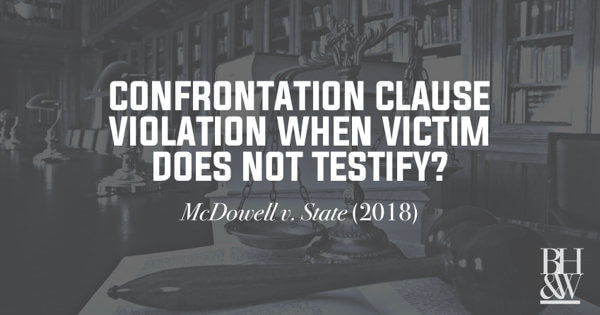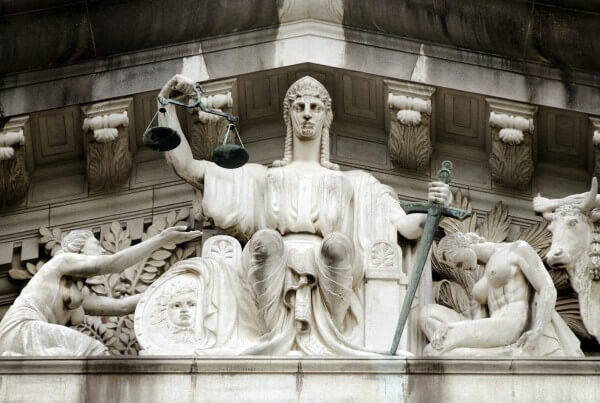 As Fort Worth criminal defense attorneys, we often encounter confrontation issues during trial. The Confrontation Clause of the Sixth Amendment gives a defendant the right to confront witnesses against him. This provision prevents admission of a “testimonial” statement–a formal statement similar to trial testimony–unless the person who made the statement can be cross-examined or is unavailable but was previously cross-examined (in a deposition, for example). In the absence of cross-examination, a criminal defense attorney in Fort Worth would object to admission of the statement as evidence.
As Fort Worth criminal defense attorneys, we often encounter confrontation issues during trial. The Confrontation Clause of the Sixth Amendment gives a defendant the right to confront witnesses against him. This provision prevents admission of a “testimonial” statement–a formal statement similar to trial testimony–unless the person who made the statement can be cross-examined or is unavailable but was previously cross-examined (in a deposition, for example). In the absence of cross-examination, a criminal defense attorney in Fort Worth would object to admission of the statement as evidence.
In Paredes v. State, the Court of Criminal Appeals considered how the Confrontation Clause applies to DNA testimony based on computer-generated data obtained through batch DNA testing. During a robbery, two victims were shot and killed. Jovany Paredes asked Jessica Perez to wash the shirt he was wearing during the robbery. Instead, Perez gave the shirt to police, who sent it to a lab for DNA testing. DNA from blood on Paredes’s shirt matched one of the victims.
At trial, Robin Freeman, the lab director, explained that DNA testing involves four analysts. The fourth analyst interprets raw data from a computer to determine whether there is a DNA match. In Paredes’s case, Freeman herself compared the DNA profile from the blood stain to Paredes’s DNA profile. Freeman testified that she did not personally observe each of the analysts performing the first three steps but that any problem in the analysis would have been obvious. Freeman testified that the ultimate opinion was hers and that she was testifying regarding her opinion.
Paredes’s defense attorney objected, arguing that he was entitled to cross-examine the other analysts. The State said those analysts just took “physical stuff,” placed it into instruments and applied chemicals. Freeman, the State said, was the one who did the interpretation that was presented to the jury. The judge agreed with the State, and Paredes was convicted of capital murder.
The Court of Appeals affirmed, holding that Freeman’s testimony did not violate the Confrontation Clause. After the Court of Appeals decision, the CCA decided in Burch v. State that admission of a drug test lab report did violate the Confrontation Clause because the testifying witness stated that the report was a “surrogate” for the technician who performed the test. Paredes appealed based on Burch. The CCA vacated the Court of Appeals decision and remanded the case to consider whether Burch affected the decision in Paredes.
The Court of Appeals made the same decision the second time, distinguishing Paredes, where the lab director had knowledge of the tests used and conducted the crucial analysis, from Burch, where the testifying lab supervisor had not observed or performed any part of the drug test or its analysis. Because Paredes’ attorney had the opportunity to cross-examine the person who conducted the actual analysis that linked him to the crime, Paredes’ Confrontation Clause rights had not been violated.
Paredes appealed to the CCA again. The Court reviewed three U.S. Supreme Court cases involving forensic reports. In the first two cases, the Supreme Court had found the forensic reports inadmissible because only a “certificate of analysis” was presented as evidence and a testifying witness had not actually performed the test.
In the third case, a DNA case, an outside forensics specialist testified that the lab-created DNA profile matched the defendant’s DNA profile. The Supreme Court held that this evidence did not violate the Confrontation Clause.
Based on the Supreme Court cases (Melendez-Diaz and Bullcoming) and the decision in Burch, the CCA ruled against Paredes. The CCA relied on the fact that Freeman, the testifying witness, had actually performed the crucial analysis and had testified to her own conclusions. Further, the lab director had testified regarding the quality assurance system at the lab that would alert the director if the test were done improperly. The CCA also distinguished this case because Freeman had relied on raw, computer-generated data in reaching her conclusions, rather than relying on another analyst’s report. Because Paredes was given the opportunity to question Freeman regarding her opinion, the CCA held that his Confrontation Clause rights were not violated.
A Fort Worth criminal defense attorney whose client is facing forensic expert testimony will carefully consider Paredes. Challenges to DNA evidence may be more difficult, particularly if the testifying witness is the individual who actually translated the raw data into a conclusion regarding a DNA match. A criminal defense attorney in Fort Worth will carefully monitor the application of Paredes to cases with similar, yet different, facts.









